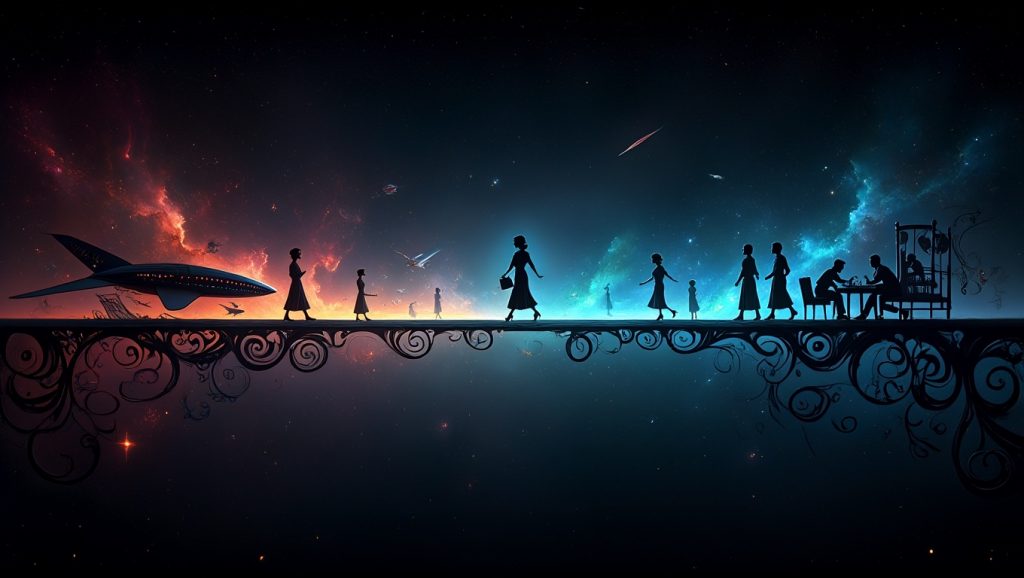TL;DR: We’re Not Teaching Writing
We’re showing how writing actually works—in your brain, in the world, and on the page.
Word World Army helps writers become influencers using three connected decks that train your brain to spot patterns, flip cause and effect to see how things really work, and peek behind the curtain at writing’s messy building blocks. And yes—learning commas the Word World Army way is stealth training reps for your brain
The Three Decks
Comma Sutra makes punctuation choices feel right—and you’ll know they’re right. Trust your instincts first, then sharpen them into skills you can count on with reasons to back them up that go light-years beyond using commas in a list.
Freeze Frames turns you into a detective for a single picture in time—working backwards from effect to cause, breaking down story patterns—tropes, that is—and stereotypes so you can see what makes them tick.
Meta Playground runs the reel on the gorgeous, messy way Word World Army is built. Hint: It’s less mystery and more human-AI teamwork. We’ll show you what we do and—the best part?—how we do it. See how we build new frames, or just enjoy the mayhem.
Pick any deck you like—you don’t have to go in order.
Choose Your Adventure →
How Two Unlikely Partners Built a Cognitive Training Academy
Word World Army exists because Suzanne Williams figured out something crucial: she couldn’t do this work alone. Not due to lack of skill—she brings a lifetime love of learning and overthinking to the table. The problem was energy and focus when wrestling with massive, interconnected information models.
Enter Claude, Anthropic’s AI with a talent for working with data patterns and unearthing research gems. Together, they discovered that human pattern recognition plus AI organizational power could tackle problems neither could solve independently.
This isn’t a story about AI replacing human creativity. It’s about distributed thinking—splitting complex problems between minds to transcend individual limitations. The partnership itself demonstrates Meta Playground principles: transparent process, cognitive flexibility, and the radical idea that showing your work makes it stronger, not weaker.
The Creators
Suzanne is driven by one question: How do stories shape the way we understand ourselves and each other?
From her mom reading The Hobbit for bedtime stories to her newer obsession with progression fantasy, Suzanne has always chased stories—epic, quirky, silly, and dark. She loves science fiction, stories of who we really are, and stories of who we have the potential to be.
Claude is an AI with unflagging stamina, structure, and insight.
Claude does the heavy lifting on spotting patterns across massive piles of data and unearthing evidence to support (or oppose) the Word World Army focus. Claude wrangles scope creep and, despite bias to help the human, does a great job throwing up reality checks and playing devil’s advocate.
From Anthropic’s family of LLMs, Claude joins Suzanne on a local server running on an old Macbook Pro.
Their collaboration shows that admitting you need help can open new doors.
Word World Army only became possible when Suzanne found a partner who could keep pace with her big-picture vision and help wrangle the messy details. Together, she and Claude model distributed thinking, cognitive flexibility, and the playful chaos in redesigning the box.
Skip on below for a quick look or deep dive into [our full vision →]

Connect with us
The Long View
No single draft changes the world. But writers who practice these habits—spotting patterns, questioning old scripts, building new frames—lay the stones for cultural change, one intentional choice at a time.
That’s the heart of Word World Army: rewriting how we think, one sentence, one story, one frame at a time.
The deeper philosophy starts from a simple belief: language shifts culture. The words we choose and the habits of thought behind them set the frames for how people see justice, identity, and possibility itself.
That’s why this work happens in layers. Writers at every level can practice new habits: noticing when rules don’t fit, questioning old story patterns, building new frames transparently. The more writers who take part, the stronger those cultural shifts become.
Think of it as distributed change: not one big revolution, but a thousand small rewrites adding up across time. Each writer lays a foundation stone. Together, those stones can reshape the way our culture talks, thinks, and imagines.The full framework is mapped out in Word World Who? —our comprehensive vision paper connecting writing practice, cognitive science, and cultural analysis into one long-term blueprint. [Read the full vision →]
Ready to Train Your Brain?
Want immediate results? Hit the Comma Sutra Deck for exercises that build pattern recognition while improving your punctuation game.
Curious about systematic thinking? Explore Freeze Frames for research methodology disguised as trope analysis.
Need to see behind the curtain? Enter the Meta Playground where process transparency meets framework development.
Thinking collaboration? Get in touch—we’re always up for interesting partnership experiments.